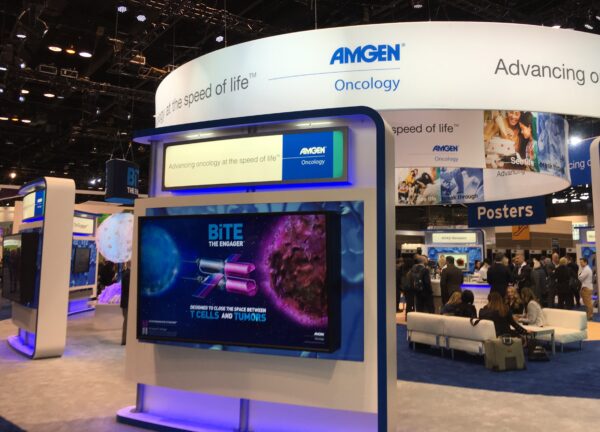
Amgen’s booth at the 2019 ASCO conference in Chicago
An investigational drug that goes after a molecular target that is a known driver of many cancers but was long thought “undruggable” presented new data at an oncology conference over the weekend. But although the drug showed activity, it got mixed opinions from analysts.
The Thousand Oaks, California-based biotech company announced Saturday the presentation of new Phase I data on AMG 510, an inhibitor of KRAS G12C, in colorectal and appendiceal cancer at the European Society for Medical Oncology’s 2019 conference in Barcelona, Spain. The company also included data in non-small cell lung cancer that it had presented last month at the World Conference on Lung Cancer, also in Barcelona.

With the Rise of AI, What IP Disputes in Healthcare Are Likely to Emerge?
Munck Wilson Mandala Partner Greg Howison shared his perspective on some of the legal ramifications around AI, IP, connected devices and the data they generate, in response to emailed questions.
Of the 55 patients included in the analysis, 29 had colorectal cancer, including 12 who received AMG 510 at the target dose of 960mg once daily. Among those patients, one experienced a partial response (PR), while 10 had stable disease, yielding a partial response rate of 8 percent and overall disease control rate of 92 percent. In appendiceal cancer, two patients were evaluable, with one experiencing a partial response and another experiencing stable disease. Apart from two incidents of Grade 3 treatment-related side effects of diarrhea and anemia, adverse events were otherwise all Grade 1-2.
“We are encouraged by these early results, particularly since these patients have progressed after receiving a median of four prior therapies, and in some cases as many as 10,” Amgen executive vice president for research and development David Reese said in a statement. “The data suggest there are relevant molecular differences between tumor types. We are initiating combination studies to further explore the potential of AMG 510 in lung and colorectal tumors.”
However, the response from investment bank analysts was more mixed.
In a note to investors Sunday, Cowen analyst Yaron Werber wrote that the 8 percent PR rate shows the drug is active, but that was lower than the rate of 10-20 percent that he and colleagues had hoped for and also below the 20-30 percent overall response rate that would be needed to support AMG 510’s development as a single-agent therapy. In other words, the response rate positions the drug as part of a combination therapy, he wrote. On the other hand, the bar is very low for such heavily pretreated colorectal cancer, with the overall response rate from standard of care estimated at 5-10 percent.
Meanwhile, Oppenheimer analysts Silvan Tuerkcan and Jay Olson wrote that the response rate was in line with expectations given prior statements from the company. Moreover, they wrote, the 92 percent disease control rate is encouraging given that patients in the study had failed on at least three prior lines of therapy.
Photo: Alaric DeArment, MedCity News















